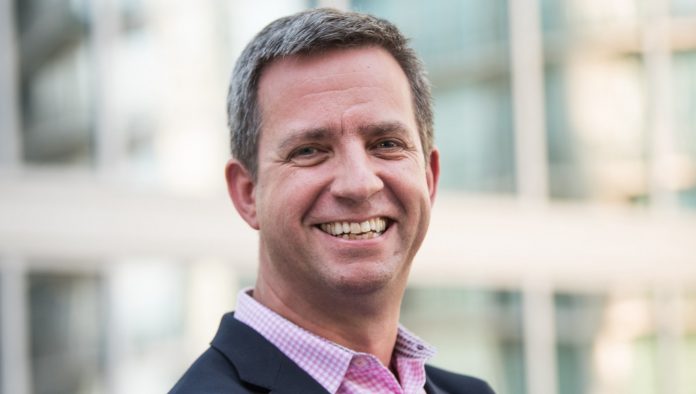CEO of Conga Noel Goggin is also the company’s culture leader. He has proven himself in the software industry, having spent 24 years in leadership and management positions, including CEO, EVP, and SVP.
At Conga, Noel Goggin takes his successful record in “organic and acquisition-based business growth, product definition/development, and customer relationship optimization.” As a leader, he is “transformational, innovative, and pragmatic,” and who works hard in building and maintaining “exceptional levels of success on a national and global scale.”
Noel Goggin leads Conga through his “entrepreneurial approach in translating ideas into actionable solutions, building and sustaining top-performing teams, and leveraging deep insight into markets, particularly enterprise software.” He regularly works with “senior executives and other key stakeholders to further business development objectives.”
Likewise, Conga benefits from Noel Goggins and his “excellent ability to locate, hire, and direct top talent across multiple areas.” His leadership style motivates and empowers his employees, pushing them towards exceeding all expectations. His teams are also “frequently recognized for significant contributions.”
For Conga, Noel Goggin is poised to improve the company’s position as the “leader in digital transformation for business processes, empowering organizations to drive better insights and outcomes and achieve peak performance.” The company has its headquarters in San Mateo, California, while also having a global presence across North America, Europe, and Asia.
Check out more interviews with software executives here.
Where I come from, nothing is impossible. Noel Goggin, Conga
Jerome Knyszewski: Thank you so much for joining us in this interview series! Before we dive in, our readers would love to “get to know you” a bit better. Can you tell us a bit about your ‘backstory’ and how you got started?
Noel Goggin: Where I come from, nothing is impossible. I was raised in a somewhat sheltered environment having grown up on a dairy farm. I had never flown anywhere, we didn’t take vacations, and summers and weekends were spent working. This taught me the importance of hard work and the need to get things done.
Prior to starting my career, I went to one of the top engineering schools in Ireland, Dublin City University. I completed my first internship with Retix during my third year and joined the company full-time after graduation. The company had a great start-up feel and was a lot of fun, but it was also a bit of a sink or swim situation. With little guidance or structure — my colleagues and I were forced to figure things out on our own.
I’m also dyslexic, and as a result, I discovered I have a natural curiosity to understand things holistically. As I was traveling around Europe for my first job, the curious and fearless side of me, combined with my ability to be self-sufficient, really helped me to get started in my career and experience success early on.
Jerome Knyszewski: Can you tell us a story about the hard times that you faced when you first started your journey? Did you ever consider giving up? Where did you get the drive to continue even though things were so hard?
Noel Goggin: I’ve dealt with many hardships, but there is one period in my life that stands out. I founded a company called Ecovate in 2000. We were fortunate to receive funding from well-known VCs including Trinity Ventures and Battery Ventures. But shortly after we started the company, the internet bubble crashed and many of the companies we worked with went out of business overnight. All of this was going on at the same time I had my first child.
Some of the VCs trusted us enough to give us seed money to build something new. We created a new start-up, StorePerform, in the retail software space — an industry I knew nothing about. We bootstrapped the company at the same time my second child was born. Shortly after, 9/11 took place, and around this time my Green Card was about to expire. I was earning no money, my wife and I were a few months away from having to leave the country, and I was working in a space I wasn’t familiar with. It was an incredibly challenging time.
Fortunately, we started to sign some big accounts in a short period of time. This gave us funding and allowed us to secure some other big accounts. And eventually, other good things started to happen.
When I look back, of course it was hard and I thought about giving up but my grit and conviction from my farming background drove me to find a way to make it work. And with a bit of Irish Luck, we got our Green Cards just a month shy of their expiration.
Jerome Knyszewski: Can you share a story about the funniest mistake you made when you were first starting? Can you tell us what lessons or ‘takeaways’ you learned from that?
Noel Goggin: I’ve made a lot of mistakes in my professional life, but one mistake, which is only funny now after many years, was on my first business trip to Italy. I’m a naturally trusting person, so when I landed in Rome I grabbed a taxi. Before I knew it, the taxi driver had turned down a dark alley and took all my cash. I spent the entire day with the Italian police trying to track down the driver, which ended up being a waste of time. I quickly learned to get street smart. Literally.
Great companies have that discipline and rigor to stay focused and keep on track.
Jerome Knyszewski: Based on your experience and success, what are the five most important things one should know in order to lead a company from Good to Great? Please share a story or an example for each.
Noel Goggin: I don’t believe there are five things required to lead a company from Good to Great. There are many factors, but the notion of a culture of discipline is critical. There must be real rigor and discipline to do things. This could be a culture of discipline to agree on things not to do. But also the ability to be focused on what you want to get done. At Conga, this is what we use to manage our thought process, engineering, or any hard decisions we have to make. Great companies have that discipline and rigor to stay focused and keep on track.
Jerome Knyszewski: Extensive research suggests that “purpose driven businesses” are more successful in many areas. Can you help articulate for our readers a few reasons why a business should consider becoming a purpose driven business, or consider having a social impact angle?
Noel Goggin: The short answer is yes, companies should seek to be purpose driven businesses. But there are two dimensions to this. There’s a purpose of philanthropic DNA and servanthood. And there is a dimension of what we do and why we do it, and the purpose of that.
For the first, I believe that we have a privilege and obligation to be generous — whether that’s the giving of time or helping others, whatever speaks to each individual in an organization. Companies like Conga who are profitable and do well, should find ways to do that. They should help the brand, not detract from the brand of the company.
What a company does should also have an impact. There needs to be purpose and a reason for being. And this becomes a part of the company’s North Star.
Transparency is key. Noel Goggin
Jerome Knyszewski: As you know, “conversion” means to convert a visit into a sale. In your experience, what are the best strategies a business should use to increase conversion rates?
Noel Goggin: Focusing on the customer is one of the best strategies to increase conversion rates. By showing genuine curiosity and concern about your customers’ business, listening and learning vs telling and selling, helps identify clear pain points and creates a two way dialogue. Talking in their terms allows you to focus on business processes and problems vs features and functions.
Jerome Knyszewski: Of course, the main way to increase conversion rates is to create a trusted and beloved brand. Can you share a few ways that a business can earn a reputation as a trusted and beloved brand?
Noel Goggin: Transparency is key. Customers want to work with people who are genuinely concerned for their well-being. This could come in the form of ensuring you can solve their business needs and not overcommitting. This could also be involved during times of having direct and difficult conversations with customers so that they don’t make bad decisions. Doing this with the right bedside manner is always valued over time. For me, it is a critical measure in aligning our interests with our customers.
Jerome Knyszewski: How can our readers further follow you online?
Noel Goggin: Follow me on LinkedIn.
Jerome Knyszewski: This was very inspiring. Thank you so much for the time you spent with this!





